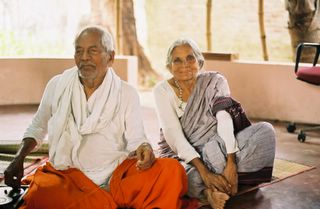Home!
From the train...It looks mostly like I remember on my first visit 29 years ago. (Even the train is the same!) In the big cities, one sees huge construction, skyscrapers and apartment complexes and traffic (some make up of autorickshawn drivers on methamphetamine, so watch out!) Signs of prosperity everywhere. When you get to the smaller cities and towns, things are more mixed. Everything looks about one third built, with bricks and pipes piled haphazardly on the roads choked with dust piles, and the pavement a series of ruts. One can't tell simply by looking whether it is one-third built and growing up, or one-third built and falling down.
But from the train, there are the rural environs. And one gets the sense of a truly "lived in" environment. Goats, banana trees, rice paddies, dry tributaries (inland there is a bit of a drought), and people in the fields. But there are differences - where are the water buffaloes (I have now been here three days and have not seen a single one)? Many fewer cows as well - I will have more to write about this later.
And here is home - Gandhigram! Here is Krishnammal coming to meet me, with her fluid movements and uncanny grace - she is now 80 - she will say 82, occasionally 83, but I know better (she was born June 16, 1926). There is some excuse for the discrepancy - Tamils consider themselves one when they are born. But the reality is that she pays no real attention to ages, and we have a joking relationship around my correcting her.
Jagannathan is very frail. He is blind in both eyes, and here's just a little bit out of his right ear. Sleeps most of the day, though he has the newspaper read to him, and goes on a little walk, led by others, with the Tipu the dog (who is much happier here!)
Ah, and I slept for the first time in four days. In my old room! The roof has been magnificently repaired (thank you, Grupo 1%) - the LAFTI carpenters spent a month on it, with materials purchased by our Italian friends, and it is now safe and comfortably, and as beautiful as ever, painted a pastel blue. And the children can use it when the rains come. A very good deed done.
I wake up at 6 a.m. to the usual sound of crows, and the sounds of the prayers from the children's hostel. There are currently 30 of them here, a few orphans, but mostly children of landless migrant laborers, south of Madurai. At 6 they carry their mats to a place just outside the Workers Home, and recite three prayers. The first, Gandhi's favorite, a chanting of the 100 different names that God is known by, and how they are all equal. In Sanskrit. The second, in Tamil, the Arut Perum Jothi prayer, an acknowledgement of the light of compassion coming to rule the world. And the third, the Gandhi hymn, Raghupati, (in Hindi) again, a cross-religious invocation. Then the children start sweeping the environs, and set up the the light worship prayer lamp in the open part of the covered pandal. Soon, it will be off to school, but not before I amuse them wtih my broken Tamil.
Later, I visit my veena teacher in Dindigul, now in her 80s. She says she had a dream last night that I was coming to visit. Because of a stroke, she can no longer play, but I get the veena out of the box, and do the best I can, given my lack of practice. I am accompanied by a Japanese woman, a Ph.D. student studying the prawn farms (much more on that later, of course.)
Oh, and so what of the lack of water buffalo? It seems that, for all the "economic miracle" of India, the rural folks - richer and poorer alike - continue to get poorer. The buffalo and cows are being sold off for quick money to slaughter houses in Kerala, where the beef is then shipped to the Gulf countries. I am keenly aware that it is the constant pressures on the wealthier landholders that makes LAFTI's land reform work possible, and workable, provided those given the land stick to subsistence agriculture. But the marketplace is very depressed, and it is difficult to see where it will all lead.
In the field outside my window are two Holstein! cows! I ask Krishnammal about them. She says they were bought especially because they give good milk, one gives six liters in the morning and six liters in the evening. But the man who cares for them has been selling the milk into the marketplace. Why, asks Krishnammal, given that there are 30 poor children right there who need the milk? Because, says the keeper, not to sell the milk is "uneconomical". There, in a nutshell, is capitalist globalization at work, where simply meeting one's own needs, free of the marketplace, is "uneconomical", and certainly not part of the GDP. At any rate, Krishnammal has put an end to the practice, and my morning coffee is made with the milk from the mother Holstein. (don't worry, I left plenty for the kids.)
I have five days of writing from one day's conversations! Please be patient with me - I will catch up (now that I know this local Internet cafe can now use my jump drive.
Good to be home!


0 Comments:
Post a Comment
<< Home